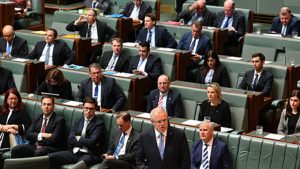Home » Commentary » Opinion » Even in defeat, the Liberals have a rich future – just look to history
· The Sydney Morning Herald
 For nearly three years, the polls, pundits and betting markets have consistently put Labor in a winning position, pointing to a landslide. But such is the magic of politics that Saturday’s contest could be a lot closer than anyone had the right to expect a week ago.
For nearly three years, the polls, pundits and betting markets have consistently put Labor in a winning position, pointing to a landslide. But such is the magic of politics that Saturday’s contest could be a lot closer than anyone had the right to expect a week ago.
Remember that during the past half century, close federal elections always favour the incumbent. Scott Morrison’s path to victory is about as narrow as Donald Trump’s path to the White House in 2016.
Still, the smart money is on a third Coalition loss in a dozen years. If indeed that happens, get ready for a new round of doom-mongering. In coming days, we’ll be told the Liberal Party is bereft of ideas, talent and leadership and that the country has moved on. On Monday night, the ABC’s Four Corners plans to link a Tony Abbott defeat in Warringah to the dwindling influence of conservatives in the new era.
However, history provides several pointers to why the Liberals should not be written off as a political force.
Following Harold Holt’s death in late 1967, it was (of all people) Robert Menzies who told his daughter Heather: “I am witnessing the destruction of the party … [it’s] a leaderless rabble, and I have great fears for the future.”
Yet the party has won four landslides and has been in power for nearly two-thirds of the period since Menzies’ lament.
After great defeats, the party turns the kiss of death into mouth-to-mouth resuscitation: it bounces back with tremendous force.
Following Gough Whitlam’s election in 1972, the party had barely registered a pulse under the hapless leader Billy Snedden. In Robert Menzies: The art of politics, Troy Bramston documents how Menzies became so disillusioned with his successors that it’s unlikely he voted Liberal in the early to mid ’70s. “The idiots who now run the Liberal Party,” he privately lamented in 1974, “will drive me around the bend.”
Yet within 18 months, Malcolm Fraser smashed Whitlam and led the Liberals to one of the greatest electoral landslides in Australian history – and he repeated the effort two years later.
Fast-forward to 1993. Following the Coalition’s fifth consecutive election loss, the eminent historian Judith Brett declared: “The Liberal Party in the 1990s seems doomed.”
A year later, in 1994, NSW Liberal senator Chris Puplick warned the party was “still seen as exclusionist, hostile to new ideas and new people and too concerned with trying to bring back the ‘good old days’”.
Yet within two years John Howard, who’d been widely dismissed as yesterday’s man, annihilated Paul Keating, defeated Labor in three more elections and stayed in power for about a dozen years.
A decade ago Tony Abbott faced a similar barrage of media and intellectual criticism to that which Howard had faced. Shortly after he won the Liberal leadership in late 2009, the distinguished intellectual Robert Manne predicted “the destruction of the Liberal Party” because the party’s “troglodyte-denialist wing” was in control.
Laurie Oakes, the then doyen of the Canberra press gallery, predicted Abbott as leader would be “electoral poison”. Brett warned that “the Liberals risk becoming a down-market protest party of angry old men in the outer suburbs”.
Yet within a few months, the “troglodyte-chief”, as Manne dubbed Abbott, knocked off Kevin Rudd and his emissions trading scheme before pushing Julia Gillard’s Labor into minority government. He went on to win a landslide election three years later on a pledge to repeal the carbon tax.
Bear all this in mind when the experts once again write the political obituaries of the 75-year-old party.
Should they lose, there is no point in the Liberals crying over the corpses on the battlefield. If the post-election assessments become an auction in recrimination and the inquest an excuse for further character assassination, then the Liberal period in opposition will be an era, not an interlude.
Historically, the Liberal Party has properly claimed to be the repository of both conservatism and liberalism. At its core, that means a commitment to individual freedom, a dedication to a strong national defence, support for an inclusive civil society, a scepticism towards the taxing, spending, regulatory and privacy-shedding powers of a large, centralised government, and an insistence upon the prudent management of the people’s financial affairs.
Philosophical conformity within the Liberal Party has never been achievable or desirable. But every leader who has won power from opposition – Fraser, Howard, Abbott – has hailed from the party’s centre-right tradition.
Even in defeat, the Liberals would still boast talent. Whoever is their leader must ensure it is not wasted.
Tom Switzer is executive director of the Centre for Independent Studies and a presenter at the ABC’s Radio National.
Even in defeat, the Liberals have a rich future – just look to history